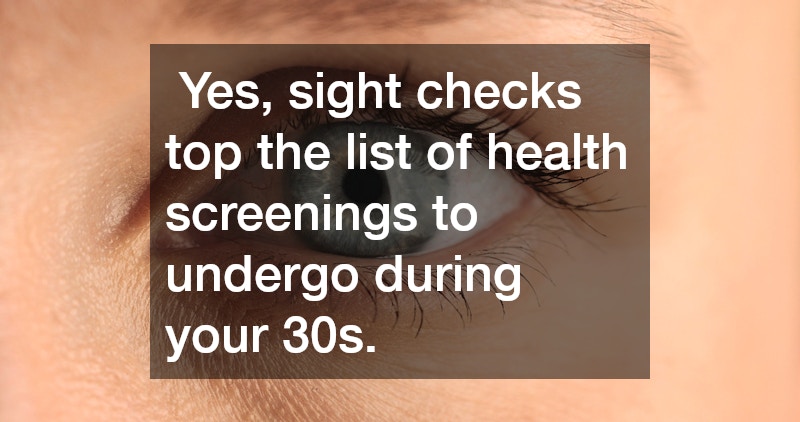
Yes, sight checks top the list of health screenings to undergo during your 30s. If you wear glasses, your 30s offer the ideal time for your optometrist to tell you if you’re a candidate for laser surgery. A person’s eye prescription typically levels out at 40 years of age, so eye doctors do the surgery then.

What can an eye test detect, you ask? Besides determining if laser surgery would benefit you, an eye doctor uses eye testing tools to check for cataracts, peripheral vision, diseases of the eye, and overall eye health. If the doctor notes any vision acuity problems, the eye prescription test results in a prescription lens measurement for each eye.
A woman’s 30s includes other healthcare firsts. This decade of a woman’s life includes her first mammogram, cervical cancer screenings, and tests for diabetes. If you have a family history of heart disease, your 30s should also include a cholesterol test.

Your primary care physician may suggest other medical tests depending on your family medical history. If you change doctors during your 30s, review your medical history and that of your family with your new primary care physician. Ask if they would suggest any first-time tests or follow-ups to tests that your previous physician conducted.

Your thirties is a time of excitement, growth, and achievement. For many women, the third decade is also extremely busy. Between reaching new pinnacles in your career, traveling new places, or raising a family, it can be hard to find time to take care of your health.
Though you may feel great in your thirties, this decade of adulthood is often a time when early health warning signs start appearing. What might feel like an achy back or a consistent feeling of exhaustion could actually be signs of something more serious.
Stay at the top of your game by taking control of your health. For the best disease prevention and early detection, consider scheduling the following exams in your thirties:
Blood Pressure Tests
Though medical opinions differ on how often individuals should receive blood pressure tests, most doctors agree that all adults should be tested at least every three to five years after the age of 20. By the age of 40, the USPSTF recommends annual blood pressure tests.
Depression Screenings
Since 2016, the U.S. Preventative Services Task Force has recommended all adults, including pregnant and postpartum women, be regularly screened for signs of depression. The test includes a series of simple questions from your doctor, and studies show that routine screenings lead to overall health improvements for patients.
If you’re uncomfortable bringing up depression with your regular doctor, consider a telepsychiatry service. A review of 126 studies found that telepsychiatry is consistently well-rated by both patients and practitioners. If you live in a rural area with few mental health options available, telepsychiatry might be a great way to still care for your mental health in your thirties.
Mammograms
While regular mammograms are most highly recommended for women over the age of 45, an early test can be a great choice for your long-term health. After all, studies have found that mammography reduces the risk of breast cancer fatality by between 20% and 40%. If you notice any changes in the shape or skin of your breasts, it is especially important to get a mammogram to rule out breast cancer.
HIV Screening
Everyone between the ages of 15 and 65 should be tested for HIV, according to the USPSTF, and those with higher risk should receive more frequent examinations. Ask your doctor how often they believe you should personally be screened. Additionally, expectant mothers should be screened with each pregnancy to reduce the risk of passing the virus to the baby.
Though your doctor may recommend regular blood pressure screenings, don’t forget other aspects of your health, including mental health and sexual health. Get tested early and regularly to care for your body for many great decades to come!


